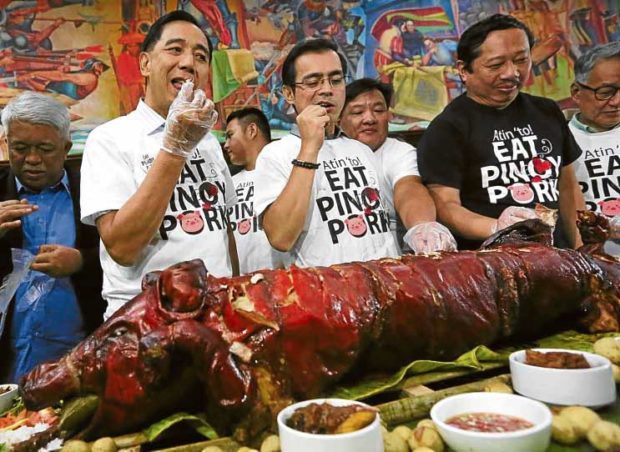Cases of African swine virus down, but still no end in sight

SAFE TO EAT Agriculture Secretary William Dar (left) joins Manila Mayor Francisco “Isko” Domagoso (middle) in a boodle fight featuring roast pig prepared by the National Federation of Hog Farmers to prove that pork is safe to eat despite the African swine fever outbreak. —MARIANNE BERMUDEZ
(Last of three parts)
Outbreaks of African swine fever (ASF) peaked in September and began to wane by November, according to Agriculture Secretary William Dar.
But is the worst over? Dar believes so, although in the same breath, he said: “We have yet to see the end.”
He observed that in the last two months, the number of breakout areas had decreased. “There were not as many cases like before. This means our protocols are working and our hog raisers are becoming more cooperative than before,” he said.
While not harmful to humans, the ASF virus is easily transmitted because it can stay alive for days on clothes and shoes, in processed meat, and in parasites such as ticks. An innocent-looking ham sandwich, pork products from a contaminated country, or leftover food discarded by restaurants, hotels and airlines can transmit the disease when these are recycled by hog raisers as swill or pig feed.
Article continues after this advertisementWith no known vaccine or cure, ASF can kill pigs in two to 10 days on average. It can be contained only through massive culling and isolating infected areas from the regular pork trade.
Article continues after this advertisementProtocol
The Department of Agriculture (DA) follows the 1-7-10 protocol to control the spread of the virus.
This means killing off all hogs and disinfecting all areas within one kilometer of the disease’s ground zero, controlling the movement, shipment and sale of hogs within the 7-km zone, and monitoring those within 10 km.
According to Dar, the government is implementing a mapping zone to classify ASF-affected areas and monitor the movement of tainted meat. The map also guides local government units (LGUs) in handling their pork trade, especially those whose constituents rely heavily on raising livestock for sustenance.
At a meeting with Inquirer reporters and editors early this month, Dar said the different regions had been grouped into five color-coded zones to indicate the level of ASF contamination.
Regions are classified into the “free zone” and the “contaminated zone.”
Provinces under the free zone have no reported cases of ASF, such as those in the Visayas and Mindanao, as well as the island provinces of Catanduanes and Masbate. Those within the zone can freely trade their hogs and pork products anywhere in the country as long as they follow standard shipment protocols.
Dar said President Duterte had approved the establishment of designated cold examination areas at the major ports to contain the disease.
Indemnity fees for affected hog raisers were also raised by the national government, with loan programs to cater to those who wish to rebuild their livelihood.
Dar appealed to hog raisers, especially those involved in the backyard industry, to serve as the government’s foot soldiers in combating ASF.
He said swill feeding should be a practice of the past.
Local gov’ts pitching in
LGUs are doing their part in stopping the spread of ASF.
In Quezon City, where cases of the disease have been reported, hog raising is gradually being phased out in compliance with the Housing and Land Use Regulatory Board’s provisions, Mayor Joy Belmonte said.
The Cebu provincial government has stood its ground in banning the transport and trade of live hogs, pork and pork products from Luzon and countries hit by ASF, insisting that this measure would protect its P10-billion hog industry.
After initially setting a 100-day ban that would have ended on Dec. 8, Gov. Gwen Garcia extended the ban to June 30, 2020, saying there were no signs that ASF had been contained in areas where it was detected.
Hog raisers and sellers in Cebu lauded Garcia’s move. But it didn’t help convince local consumers that there is no danger in eating pork.
“The ban benefits us because it prevents ASF from spreading here. But in terms of sales, people are scared to eat pork. We need to educate the people that it is safe to eat pork,” said Rolando Tambago, president of the Central Visayas Pork Producers Cooperative (CeViPPCo) and Virginia Farms Inc.
To ensure that the ASF virus would not reach Cebu, Tambago said his group and its partners formed teams to conduct surveillance on wet markets, supermarkets, seaports, the airport and other possible ports of entry of pork and pork products.
So far, at least 500 inspections and seizures had been conducted since the ban took effect in September.
Challenges
Still, Tambago said a lot of things had to be done.
For one, he said, he noticed that it was easy to bring in pork products especially in hand-carried luggage at the airports.
Those staffing x-ray machines at the airports are Bureau of Customs and airport security officers who usually look for illegal drugs, explosives and firearms, but not agricultural products including pork and other meat goods.
Tambago said Bureau of Quarantine (BoQ) personnel only inspected baggage if these were called in by airport security officers. He said the policy should be changed to include the BoQ in monitoring x-ray machines, like in the United States.
Another challenge is monitoring the 135 ports in Cebu, as well as buses and their passengers who arrive in the province on ferries from other islands.
Ultimately, the Philippines can only declare that it is ASF-free when there are no reported cases of the disease for at least three years.
Based on the international animal health code of the Organization for Animal Health, that is the only time when the Philippines can ensure its reentry in the global pork trade.